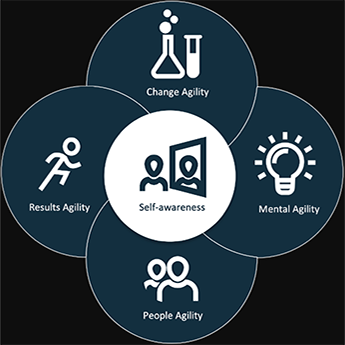Knowledge workers are information experts, leveraging their training and experience to solve problems, make decisions, come up with new ideas and drive change within the technology revolution. As the professionals and leaders of the organisation, they are ultimately responsible for strategic advancement and maintaining a competitive edge.
Learning agility is a critical skill that can accelerate the success of knowledge workers throughout their career. Research shows that agility is one of the biggest predictors of workplace performance, especially amongst more complex and senior roles.
Understanding Agility
Simply put, agility is the ability to develop new, effective behaviour, based on new experiences. It is a measure of an individual's ability and willingness to quickly learn and adapt to new situations and concepts. It involves a combination of adaptability, curiosity in the face of change and a proactive approach to acquiring new knowledge and skills.
Some people are naturally more learning agile – embracing ambiguity, uncertainty and mental health challenges, while adapting more quickly to technology. Others are more reluctant to venture into the unknown, preferring to stick to what they are familiar with.
Knowledge workers with high learning agility will develop better tools and behaviours to deal with new challenges, in a shorter amount of time. They will also set this example for their team and help to instill these values in the organisation
What does Learning Agility Consist of?
There are five dimensions to learning agility. Most people do not score high on every dimension, but rather show a unique combination of learning strengths and development areas. The good news is that agility is not set for life, rather, it can be developed with the right interventions.
Change Agility: People who score high on change agility are characterised by a constant curiosity that is fuelled by the new and the unknown. They like to experiment and try new things.
Mental Agility: People with a high score on mental agility like it when things are unclear or complex, as they enjoy creating clarity with new ideas. This agility is integral to the role that knowledge workers play in organisations.
People Agility: Those who score high on people agility are constructive toward others and are open to people with different backgrounds and opinions. They have a need to understand other people and tend to take their opinions seriously.
Results Agility: People with a high score on results agility have a strong need to be successful and are always looking for the best way to achieve results. They are often ambitious and confident, with a tendency to remain calm under pressure.
Self-awareness: People who score high on self-awareness know their own strengths and weaknesses and are development oriented. They are often critical of their own performance and actions. This makes them more adaptable, keen to do things better, and their overall willingness to learn is higher.
Developing Your Agility
The first step to developing agility is understanding how it is defined and what behaviours contribute to being agile. The second step is to understand your unique agility results. This can be done by objectively measuring your agility or by reflecting on your preferred and go-to behaviour.
Developing your agility, curiosity and adaptability can be achieved by committing to continuous learning and self-reflection, as well as by seeking out opportunities for feedback from others, experimentation and collaboration.
As knowledge workers, it is also key to embrace innovation in today's digital age and technology revolution. Technology plays a crucial role in building agile organisations, agile teams and agile people. By embracing technology and agility, organisations can create an environment that enables continuous growth and empowers individuals to adapt quickly and learn in the face of new experiences.
Author: Caitlin Quibell is a Senior Psychologist at Lumenii. Lumenii’s talent management solutions provide all the insights you need to make the best decisions about people, bringing together science, psychology and technology.
























































































































